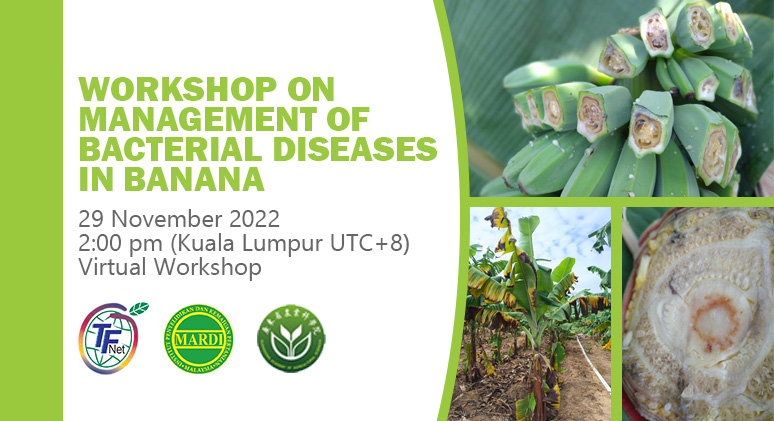Bananas are the most popular and ubiquitous tropical fruit with reference to its production, consumption, and global trade. Broadly, the fruit can be categorized under dessert bananas, such as the popular Cavendish variety and cooking bananas or plantains.
According to FAOSTAT, banana global exports generated an estimated 13.5 billion USD, which was roughly 18 percent of the total global production in 2019. This translates to an estimated 87 percent of the fruit that was domestically consumed. While the Cavendish variety dominates the global banana trade, cultivars that are domestically consumed are a mix of both the Cavendish and other local dessert varieties plus cooking bananas or plantains. Cooking bananas are grown in Asia, Africa, and Latin America as staples to provide food security and income.
The global focus on the looming threat of banana wilt disease caused by Fusarium oxysporum f. sp. Cubense ( Foc TR4) to the Cavendish variety is imperative and apt, considering the variety is a globally traded commodity. While the current global focus is mainly on the banana wilt disease caused by Foc TR4, ostensibly, relatively less attention is given to the management of bacterial diseases. which generally affects cooking bananas.
Bacterial diseases of bananas can have a devastating impact on food security and income for smallholder farmers. In recent years, there have been reports of an upsurge of bacterial diseases, mainly in cooking bananas. Observably, the impact of banana bacterial disease prevalence and seriousness differ in the different banana growing regions. Southeast Asian countries such as Indonesia, Malaysia and Philippines have reported serious incidences of banana blood disease and MOKO which are caused by the bacterial Ralstonia syzygii subsp celebensis and Ralstonia solanacearum, respectively. Other important banana bacterial wilt and rot diseases are caused by Xanthomonas sp, Erwinia sp., Dickeya sp. and Klebsiella varicola have been reported in Africa and China.
The challenges posed by these bacterial diseases have led to substantial research and development initiatives undertaken particularly on management practices to reduce infection and minimizing spread. These include studies in the distribution of pathogens in different regions, disease epidemiology, pathogen-host interaction, mode of spread, molecular study of isolates, and use of induced systemic resistance to boost plant tolerance.
Cognizant of the many research undertaken in different producing countries, and the impact of the disease to food security and income, International Tropical Fruits Network (TFNet) is partnering with the Malaysian Agricultural Research and Development Institute (MARDI), Fruit Tree Research Institute, Guangdong Academy of Agricultural Sciences, China (FTRI, GDAAS) to organize an online workshop to share and discuss current status of the diseases and strategies to manage and prevent their spread. The online workshop is scheduled for Tuesday 29 November 2022, at 2.00 pm (Kuala Lumpur, Guangzhou time)
The objectives of the workshop are:
- To share information among researchers and stakeholders on the recent status of banana bacterial diseases in Asian and African countries, current research focus to elucidate pathogen and disease characteristics and management strategies recommended to combat the diseases.
- To discuss on research priorities and possibilities of joint projects and collaborations among research institutions and stakeholders
- To enhance networking among those working on banana bacterial diseases
Speakers
Tentative Program
Date: 29 November 2022 (Tuesday).
Time: 2.00 PM (Kuala Lumpur, Guangzhou, Manila), 7.00 AM (Rome), 9.00 AM (Kampala) 11.30 AM (Delhi,) 1.00 PM (Ho Chi Minh City, Jakarta), 4.00 PM (Brisbane), 6.00 PM (Suva),
| Time | Content |
| 2.00 – 2.10 pm |
Introduction Dorothy Chandrabalan (TFNet) |
| 2.10 – 4.45 pm | Presentations Chair: Dr. Li Chunyu, GDAAS, China |
| Dr. Nandita Pathania Queensland Department of Agriculture and Fisheries, Australia |
‘Status of bacterial diseases and their impact on the Australian banana industry’ |
| Dr. Rozeita Laboh Horticulture Research Centre Malaysian Agricultural Research and Development Institute (MARDI), Malaysia |
‘Status of banana bacterial diseases in Malaysia’ |
| Chair: Dr. Rozeita Laboh, MARDI, Malaysia | |
| Dr. Sun Yunhao Zhongkai University of Agriculture and Engineering, PR China |
‘Pathogen profile of Klebsiella variicola, the causative agent of banana sheath rot’ |
| Dr. Lorna Herradura, Bureau of Plant Industries, Department of Agriculture, Philippines |
‘Management of bacterial diseases of local Philippine banana cultivars’ |
| Dr. Catur Hermanto Research Center for Horticulture and Estate Crop, National Research and Innovation Agency Jakarta, Indonesia |
‘Current status of banana blood disease in Indonesia and possible approaches for management strategies’ |
| Chair: Yacob Ahmad, (TFNet) | |
| Dr. Loganathan M., ICAR-NRCB, Trichy, India |
‘Bacterial diseases of banana in India: Over view on status, characterization of pathogen and management practices’ |
| Dr. Guy Blomme., Alliance of Bioversity-CIAT, Uganda |
‘Xanthomonas wilt of banana in east and central Africa – Effective management practices’ |
| 4.45 – 5.00 pm | Panel discussion / Closing Moderator: Yacob Ahmad (TFNet) |
Registration
The workshop is open to all.
Kindly register at:
https://us06web.zoom.us/meeting/register/tZ0pduqrpzkuG9J4iw9oTHMH6gtHTVJ8LP5r








